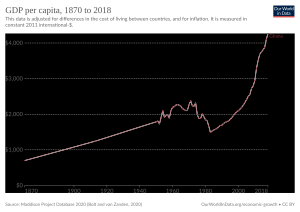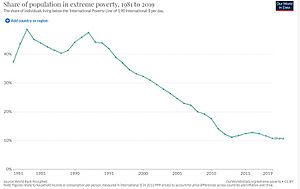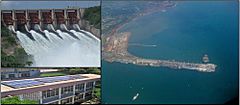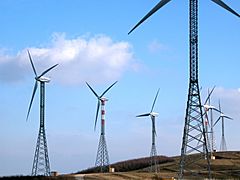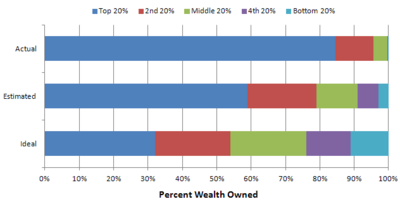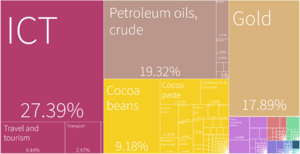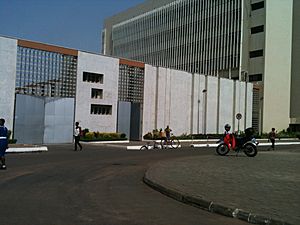Economy of Ghana facts for kids
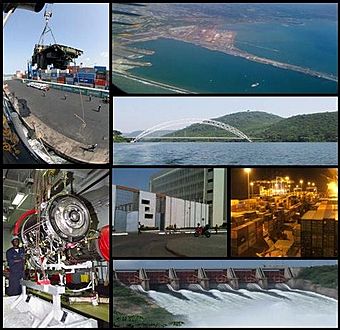
Industries of the Republic of Ghana
|
|
| Currency | Cedi (GHS, GH₵) |
|---|---|
| Calendar year | |
|
Trade organisations
|
AU, AfCFTA, WTO, ECOWAS |
| Statistics | |
| Population | |
| GDP |
|
| GDP rank | |
|
GDP growth
|
|
|
GDP per capita
|
|
|
GDP per capita rank
|
|
|
GDP by sector
|
|
|
Population below poverty line
|
|
| 43.5 medium (2016) | |
|
|
| Unemployment |
|
|
Main industries
|
mining, lumbering, light manufacturing, aluminum smelting, food processing, cement, small commercial ship building, petroleum |
|
Ease-of-doing-business rank
|
|
| External | |
| Exports | |
|
Export goods
|
fuels including oil, gems, precious metals, cocoa, fruits, nuts, ores, slag, ash, animal/vegetable fats, oils, waxes, wood, rubber, rubber articles, meat/seafood preparations aluminum
|
|
Main export partners
|
|
| Imports | |
|
Import goods
|
refined petroleum, cars, rice, delivery trucks, coated-flat rolled iron, other foodstuffs |
|
Main import partners
|
|
|
FDI stock
|
|
|
Gross external debt
|
▲ $22.14 billion (31 December 2017 est.) |
| Public finances | |
|
Public debt
|
▼ 59.3% of GDP (2023 est.) |
| Revenues | 9.544 billion (2017 est.) |
| Expenses | 24.5% of GDP (2023 est.) |
|
Credit rating
|
|
|
Foreign reserves
|
|
The economy of Ghana is all about how people in Ghana make and use money. Ghana has many different natural resources. These include things like oil, gas, and important minerals. The country also makes and sells digital technology, cars, and ships. Because of these resources, Ghana has one of the highest GDP per capita (money earned per person) in West Africa.
In 2011, Ghana's economy grew very fast. This happened after they updated how they measure their GDP (Gross Domestic Product). In 2012, most of Ghana's economy was based on services. Services are jobs like teaching, healthcare, and tourism. These jobs made up 50% of Ghana's total economy. About 28% of workers had jobs in services.
Ghana also makes some industrial products, like plastics. But most of its industrial growth comes from minerals and oil. In 2013, more than half of Ghana's workers (53.6%) were in farming.
In July 2007, Ghana changed its money. The old money was called the Cedi (₵). The new money is the Ghana Cedi (GH₵). One new Ghana Cedi was worth 10,000 old Cedis.
Ghana is the biggest producer of gold in Africa. They passed South Africa in 2019. It's also the second-largest producer of cocoa (used to make chocolate), after Ivory Coast. Ghana also has lots of diamonds, manganese (a type of metal), bauxite (used to make aluminum), and oil.
In 2005, most of Ghana's debt (money it owed) was cancelled. But later, the government spent too much. Also, oil prices dropped. This caused money problems. So, in 2015, Ghana got a loan of $920 million from the International Monetary Fund (IMF) to help.
Contents
- How Does Ghana Collect Taxes?
- What Does Ghana Manufacture?
- How Does Ghana Communicate?
- Ghana's Economic Data
- What Does Ghana Buy and Sell?
- Banking in Ghana
- Energy in Ghana
- Mining and Oil in Ghana
- Tourism in Ghana
- Farming in Ghana
- Ghana's Vision for the Future
- Economic Fairness
- Challenges Ghana Faces
- See also
- Images for kids
How Does Ghana Collect Taxes?
Value-added tax (VAT) is a tax you pay when you buy things in Ghana. It started in 1998 with one rate. Since 2007, it has had different rates. In 1998, the VAT was 10%. In 2000, it changed to 12.5%.
The highest income tax and company tax rates are 25%. Other taxes include a national health insurance tax and a tax on money made from selling property (capital gains tax). In 2013, the total amount of taxes collected was 12.1% of Ghana's income. Ghana's national budget in 2013 was 39.8% of its GDP. In 2021, Ghana started collecting a tax on rent.
What Does Ghana Manufacture?
Ghana has a fairly developed manufacturing industry. They make things to use in the country instead of importing them. This includes making electronics.
- Rlg Communications is the first company in Africa to build laptops, desktop computers, and mobile phones. It is the biggest company for information and communications technology (ICT) and mobile phone making in West Africa.
- Ghana also started making cars. They built a special SUV called the SMATI Turtle 1. It was made for rough African roads. Since 2014, Ghana has also made electric cars for city use.
- In 2012, there were four main companies making textiles (fabrics): Akosombo Textiles Limited, Tex Style Ghana Limited, Printex Ghana, and Ghana Textile Manufacturing Company.
- The Ghana National Petroleum Corporation and Ghana Oil Company explore for and refine crude oil and gas.
How Does Ghana Communicate?
Ghana's communication industry is growing fast, especially with mobile phones.
- In January 2022, over 41 million people in Ghana had mobile phone subscriptions. This means more people are using phones.
- Many mobile phone companies compete in Ghana. The biggest is MTN, with about 56% of the market. Vodafone is next, with about 22%.
- Ghana's mass media (news, TV, radio) is one of the freest in Africa. Ghana is ranked as the third-freest in Africa for press freedom.
- Ghana was one of the first African countries to connect to the World Wide Web. In 2010, there were many companies providing internet services.
Ghana's Economic Data
Ghana's economy has changed a lot over the years. Its GDP per capita (how much money each person earns on average) has generally increased over time. The percentage of people living in extreme poverty has also decreased significantly since the 1980s.
What Does Ghana Buy and Sell?
Exports
In 2016, Ghana's main exports (what it sells to other countries) were:
- Crude oil
- Gold
- Cocoa beans (for chocolate)
- Cocoa paste and butter
Ghana sold most of these goods to Switzerland, China, France, India, and the Netherlands.
Imports
In 2016, Ghana's main imports (what it buys from other countries) were:
- Refined petroleum
- Crude petroleum
- Gold
- Rice
- Packaged medicines
Ghana bought most of these goods from China, the Netherlands, the United States, Nigeria, and India.
Banking in Ghana
Ghana's banking system has changed a lot. In 2007, new rules allowed more banks to operate. This made it easier for people and companies, both local and foreign, to open bank accounts in Ghana.
Some local banks include Agricultural Development Bank of Ghana, CAL Bank, GCB Bank Ltd, and Home Finance Company. There are also savings and loan companies like ABii National.
Ghana Stock Exchange
The Stock Exchange in Ghana is one of the biggest in Africa. It's a place where people can buy and sell shares of companies. In 2012, its total value was about GH¢57.2 billion.
Energy in Ghana
In 2018, Ghana used mostly biomass (like wood for fuel) and oil for its energy. Hydropower (electricity from water) and natural gas also played a part.
Oil and Gas
Ghana found a lot of oil and natural gas offshore in the 2000s and 2010s. They started producing oil in 2010. In 2021, Ghana produced about 150,000 barrels of oil each day. This made Ghana the 34th largest oil producer in the world.
In 2021, Ghana exported over 71 million barrels of oil. China bought the most, taking over 41% of Ghana's oil exports.
Solar Energy
Ghana is building many solar power plants. They want to get 6% of their energy from the sun. Solar electricity production has grown a lot. In 2014, it was zero. By 2020, it was over 60 GWh, making up about 0.46% of Ghana's electricity.
Wind Energy
Ghana has good places for wind power, like Nkwanta and the Accra Plains. Experts believe Ghana could get about 500–600 GWh of electricity from wind each year. To compare, the Akosombo hydroelectric dam alone produced 6,495 GWh in 2011.
Bio-energy
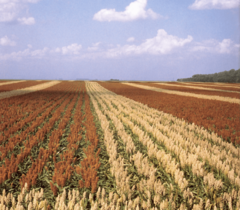
Ghana wants to use biomass (energy from plants and animals) and bio-energy to help its rural areas grow. This would create jobs and save money. The main bio-fuels used are ethanol and biodiesel.
Ghana's plan is to use bio-energy in a way that doesn't harm the environment, like causing deforestation. They want to encourage private companies to invest in growing plants for fuel and making bio-oils. New laws also help private companies develop renewable energy.
Energy Consumption
Having enough electricity is very important for Ghana's economy to grow. In 2009, each person in Ghana used about 265 kilowatts of electricity. Sometimes there are power shortages, called "dumsor," which makes people more interested in renewable energy.
Mining and Oil in Ghana
Ghana has large amounts of petroleum (oil) reserves, estimated to be between 5 to 7 billion barrels. A big oilfield was found in 2007. Since then, Ghana's oil production has increased steadily. In 2019, it reached 200,000 barrels per day.
Ghana also has huge natural gas reserves. Many foreign companies use this gas in Ghana. The oil and gas industry has greatly helped develop cities and regions in Ghana.
Mining has become very important to Ghana's economy since 2000. It grew by about 30% in 2007. The main things mined are bauxite, gold (Ghana is one of the world's largest gold producers), and phosphates.
Tourism in Ghana
The Ministry of Tourism is working hard to support and grow tourism. In 2009, tourism made up 4.9% of Ghana's economy and attracted about 500,000 visitors.
Popular places to visit include Ghana's many castles and forts, national parks, beaches, nature reserves, and World Heritage sites.
In 2011, Forbes magazine said Ghana was the eleventh-friendliest country in the world. This was based on a survey of travelers. Ghana was the highest-ranked African country in the survey.
To visit Ghana, most people need a visa from the Government of Ghana.
Farming in Ghana
In 2013, farming provided jobs for 53.6% of all workers in Ghana. The main crops grown are corn, plantain, rice, millet, sorghum, cassava, and yam. Growing crops is a very important part of Ghana's farming industry.
In 2018, Ghana produced a lot of different crops:
- 20.8 million tons of cassava (4th largest producer in the world)
- 7.8 million tons of yam (2nd largest producer in the world)
- 4.1 million tons of plantain (2nd largest producer in the world)
- 2.6 million tons of palm oil (8th largest producer in the world)
- 2.3 million tons of maize
- 1.4 million tons of taro (4th largest producer in the world)
- 947 thousand tons of cocoa (2nd largest producer in the world)
- 769 thousand tons of rice
- 753 thousand tons of orange (19th largest producer in the world)
- 713 thousand tons of pineapple (11th largest producer in the world)
- 521 thousand tons of peanut
They also grow smaller amounts of other crops like sweet potato, natural rubber, and tobacco.
Ghana's Vision for the Future
Ghana has an economic plan called "Ghana: Vision 2020." The goal is to make the economy grow faster and improve life for everyone. They plan to do this by:
- Reducing poverty through private investments.
- Quickly growing industries.
- Directly helping people out of poverty.
These plans were shared in a government report in 1995. The government is also selling off some of its companies to private owners. Other changes include controlling exchange rates and limiting imports.
The "Ghana: Vision 2020" plan expects Ghana to have a stable government and a strong economy. It also expects the government to spend money on social services, infrastructure (like roads), and industries. This plan predicts that Ghana will become a high-income economy and a newly industrialized country between 2020 and 2039.
Economic Fairness
Ghana's legal system works to stop unfair economic practices and make sure things are clear. Even with good economic progress, there are still challenges. Some parts of the system need to be improved, especially how property rights are handled. It's also not always clear how investments work. Solving these issues is important for Ghana to keep growing its economy.
According to a report in 2022, Ghana was ranked 72nd out of 180 countries for how people see public sector fairness. A higher rank means less perceived unfairness.
Health and Biotechnology
The Centre for Scientific Research into Plant Medicine is a government agency. It was set up in the 1970s to research and develop medicinal plants. This includes making herbal medicine and working on more advanced uses of plants. It also teaches foreign students about health and biotechnology.
Technology and Cybersecurity
The government of Ghana started focusing on using computers for teaching and learning in the late 1990s. Ghana's education policy now requires using information and communications technology (ICT) in schools. Most high schools and some elementary schools have computer labs.
Ghana wants to be a technology leader in West Africa. So, the government has made laws about cybercrime and improved cybersecurity. In 2008, they passed laws to set up rules for information technology. In 2011, they started developing a plan to fight cybercrime and protect important computer systems.
In 2012, Ghana created a "computer emergency response team" to help coordinate how the government responds to cyber-attacks. Ghana is ranked 2nd in Africa and 7th globally for its efforts against cyber warfare and cybercrime. In 2018, the National Cyber Security Centre was created. In 2020, a new Cybersecurity Act was passed. This law helps make sure Ghana's digital systems are safe and strong for economic growth.
Real Estate and Housing
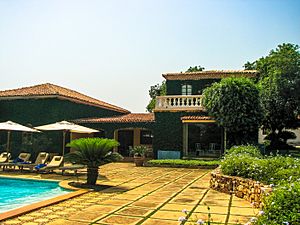
The real estate and housing market is a very important part of Ghana's economy, especially in cities like Accra and Kumasi. However, many people in Accra find housing prices too high. Kumasi is growing faster than Accra, and housing there is less competitive.
There are different taxes on real estate, like a 10% tax on rental income. The real estate market in Ghana has three main parts: government housing projects, new private housing projects, and individual private owners. Banks in Ghana help these groups. There has been a big increase in construction, bringing billions of dollars into Ghana's economy each year. People are investing in property because Ghana is in a tropical location and has a stable government.
Trade and Exports
In 2013, Ghana's main export partners were:
 South Africa: 46.89%
South Africa: 46.89% Netherlands: 12.32%
Netherlands: 12.32% India: 5.49%
India: 5.49%
Its main import partners were:
 China: 12.46%
China: 12.46% Nigeria: 11.76%
Nigeria: 11.76% United States: 8.86%
United States: 8.86%
In July 2013, a global trade office opened in Accra to help with trade and investment in areas like logistics, oil and gas, and transportation. Ghana is also trying to trade more with countries in East Asia and Southeast Asia.
Ghana's workforce in 2008 had 11.5 million people. Tema Harbour and Takoradi Harbour are major ports. Tema Harbour is Africa's largest man-made harbor. These ports handle most of Ghana's goods and exports. They are run by the government-owned Ghana Ports and Harbours Authority.
Challenges Ghana Faces
Ghana has faced some economic challenges, especially in trying to be financially stable. A big challenge has been high public debt (money the government owes). In January 2023, the Bank of Ghana reported that the country's debt was GH¢575.7 billion at the end of November 2022.
See also
- Economic history of Ghana
- United Nations Economic Commission for Africa
- List of countries by gold production
Images for kids
-
Sunyani Cocoa House and Theobroma cacao; Ghana is projected to become the largest producer of cocoa in the world. Ghana gold bars; Ghana is the 7th-largest producer of gold in the world.
 | Valerie Thomas |
 | Frederick McKinley Jones |
 | George Edward Alcorn Jr. |
 | Thomas Mensah |


